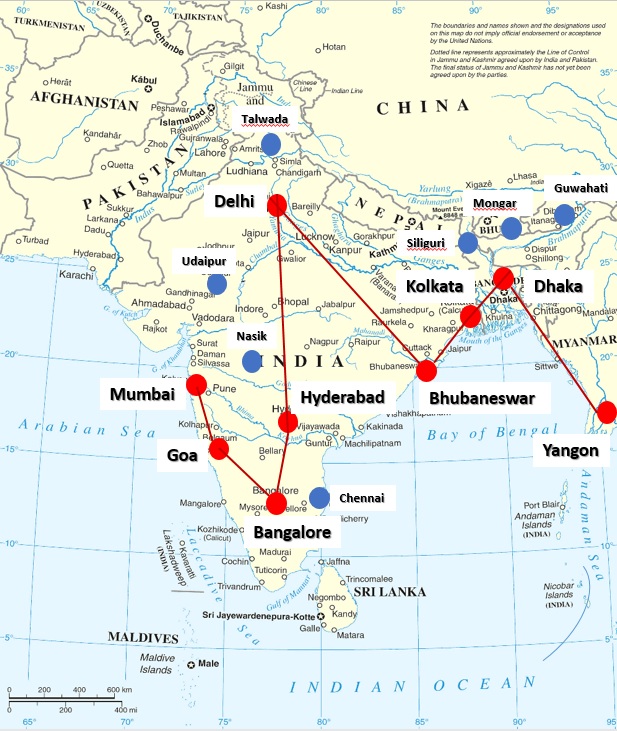 South Asia is an exciting research context for several reasons. Amidst a myriad of cultures and changing economic policies, several new forms of businesses have come up in recent times. However, several market needs are not met, and many areas are in need of positive social impact. With this in mind and thanks to the generous support from Mahatma Gandhi Fellowship, I chose to do research in South Asia. As a Ph.D. candidate in the Department of Strategy and Entrepreneurship at Kenan-Flagler Business School, I was interested in understanding whether and how businesses can play a role in social development. New organizational forms emerge frequently – but what makes them effective in being a force for good, especially in regions where the need for impact is higher? This question piqued my curiosity.
South Asia is an exciting research context for several reasons. Amidst a myriad of cultures and changing economic policies, several new forms of businesses have come up in recent times. However, several market needs are not met, and many areas are in need of positive social impact. With this in mind and thanks to the generous support from Mahatma Gandhi Fellowship, I chose to do research in South Asia. As a Ph.D. candidate in the Department of Strategy and Entrepreneurship at Kenan-Flagler Business School, I was interested in understanding whether and how businesses can play a role in social development. New organizational forms emerge frequently – but what makes them effective in being a force for good, especially in regions where the need for impact is higher? This question piqued my curiosity.
 I spent about six weeks in South Asia and met several business leaders across India, Bhutan, Bangladesh, and Myanmar. For my qualitative research project, I interviewed founders of companies which have created a positive social impact in several sectors such as agriculture and food sustainability, animal rights and conservation, affordable healthcare, skill development for low income groups, rural employment, waste management, environmental sustainability, transparency, improved governance, and others. I learned about their goals, impact they created, and the challenges they faced. My travel involved visiting cyclone-affected regions and places visiting remote villages to meet farmers. I learned that attracting and retaining talented individuals is often the key to business success.
I spent about six weeks in South Asia and met several business leaders across India, Bhutan, Bangladesh, and Myanmar. For my qualitative research project, I interviewed founders of companies which have created a positive social impact in several sectors such as agriculture and food sustainability, animal rights and conservation, affordable healthcare, skill development for low income groups, rural employment, waste management, environmental sustainability, transparency, improved governance, and others. I learned about their goals, impact they created, and the challenges they faced. My travel involved visiting cyclone-affected regions and places visiting remote villages to meet farmers. I learned that attracting and retaining talented individuals is often the key to business success.
Moreover, often what matters most is whether the business leaders perceive a ‘conflict’ or ‘complementarity’ between the social and financial goals of the firm. Firms, where the founders believe in the mutually self-reinforcing nature of social impact and profit, are the ones that can successfully maximize both. I also found that at times, external endorsement such as a third-party certification can help firms establish their identity in the labor market.
To take this research further, I hope to understand what type of business processes and activities can help firms maximize the social impact they create. My goal is to identify practices and outcomes which can encourage business leaders to increasingly adopt social or environmental missions, especially in developing economies where the demand for these is high. The Mahatma Gandhi Fellowship has certainly boosted my research, and I am thankful to the MGF Co-chairs, Carolina Asia Center, UNC’s Sangam, and the donors for the same.
The student-run Mahatma Gandhi Fellowship provides opportunities for qualified students to develop and implement civic engagement projects in South Asian communities in the U.S. and/or a South Asian country and/or one of the eight countries of the South Asian subcontinent: Afghanistan, Bangladesh, Bhutan, India, Maldives, Nepal, Pakistan and Sri Lanka. The fellowship is administered by a student-led South Asian awareness organization—SANGAM—with the administrative support of the Carolina Asia Center. On average, two qualified UNC undergraduate or graduate students per year receive up to $3,000 each.To learn more about the Mahatma Gandhi Fellowship, please visit https://carolinaasiacenter.unc.edu/scholarships/
